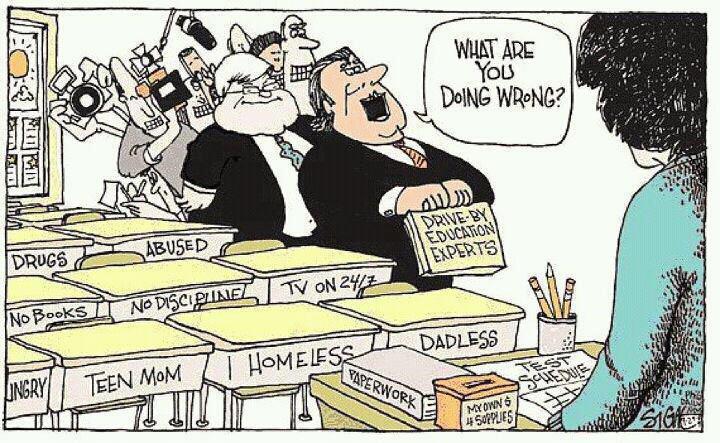Don't Blame the Teachers
Blame the curriculum.

Why has the topic of teacher quality suddenly reached such a crescendo? Education reform has been on the national agenda since 1983, the year of A Nation at Risk, but only in the last few years has the teacher-quality issue risen to the top. I think it may be reform fatigue, possibly desperation. The teacher is becoming a convenient scapegoat for America’s education reformers, who, after decades of ideas that have not panned out, cling to the belief that the flaw is not in the reform ideas themselves but in their implementation.
Teachers are being blamed for failures not their own. The “back-to-basics” and “whole-school reform” strategies disappointed. Similarly, as the National Assessment of Educational Progress has consistently shown, the state-standards movement and the No Child Left Behind law have left high-school students just about as far behind as they were before the reforms were instituted. Charter schools, despite their laudable triumphs, are highly uneven in quality, and their overall results are not much better than those of regular schools.
Teachers have understandably become demoralized by being constantly blamed for failures not of their own making. Here is the new conventional wisdom about teachers taken from a 2013 article in the nonpartisan policy magazine Governingof June 13, 2013:
The research is clear: Teacher quality affects student learning more than any other school-based variable (issues such as income and parental education levels are external). And the impact of student achievement on economic competitiveness is equally clear. That’s why it’s so disturbing that in 2010, the SAT scores of students intending to pursue undergraduate education degrees ranked 25th out of 29 majorsgenerally associated with four-year degree programs. The test scores of students seeking to enter graduate education programs are similarly low, and, on average, undergraduate education majors score even lower than the graduate education applicant pool as a whole. Education schools long have accepted under-qualified students, then offered them programs heavy on pedagogy and child development and light on subject-matter content.
This scientific-sounding comment is incorrect from the start. The assertion that “Teacher quality affects student learning more than any other school-based variable” isn’t corroborated. According to research summaries by Russ Whitehurst, a senior fellow at the Brookings Institution, a better curriculum can range from being slightly to dramatically more effective than a better teacher. That’s not surprising when you consider that the curriculum is what teachers teach and what students are supposed to learn.
Evaluating teachers based on how much they contribute to student progress in reading, for example, doesn’t make sense under current conditions in American schools. The curriculum-blind standardized tests focus on the measurement of nonexistent general skills like the ability to find the main idea, making Content Changes Key for Teacher Success - The Atlantic:

